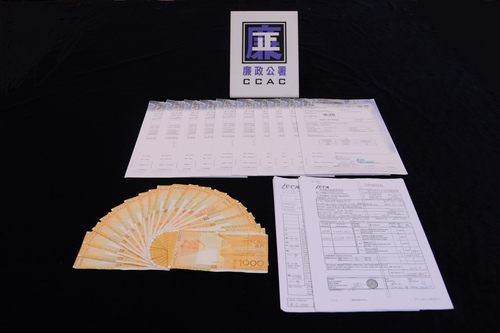 The alleged false test reports and some of the bribe money involved
The alleged false test reports and some of the bribe money involved
The CCAC unveiled a case where two employees of the Civil Engineering Laboratory (LECM) allegedly accepted bribes from some people of an engineering company in return for assistance in making false soil test reports. The relevant suspects allegedly committed offences of active bribery, document forgery by a public servant and passive bribery to perform an illicit act under the Penal Code, which may be subject to imprisonment for a maximum term of 3 years, 5 years and 8 years respectively. The case has been referred to the Public Prosecutions Office. It is reported that, in late May 2014, a gaming company discovered that a section of a public pavement outside its large-scale casino under construction caved in just a few days after the completion of road works and being opened to traffic. Subsequently the gaming company, through the general contractor of the roadworks project, requested the subcontractor to follow up the matter and present the relevant soil test reports. However, as the subcontractor did not have the tests done at the time the works took place, it would have to apply for road closure again and redo the excavation on the section if the soil tests needed to be made up. To save the hassle, a senior officer surnamed Mak and an external engineering consultant surnamed Tai from the subcontracting company decided to submit the soil test reports to the general contractor without doing the digging all again. After an in-depth investigation by the CCAC’s staff, it came to light that Tai offered bribes amounting to 40,000 patacas to an engineer surnamed S. and a laboratory technician surnamed Tam from LECM, who then returned the favour by producing, with the assistance of Mak, 10 bogus soil test reports. Those reports were later on sent to the general contractor by Mak as proof of quality for the section concerned. During the investigation, some confessed having accepted kickbacks from the people of the subcontracting company and having made the said bogus test reports without actually taking samples and conducting examinations. The CCAC’s staff also found that there were already noticeable cracks on the concerned section within less than half a year after it was filled and opened to traffic. To ensure the safety of drivers and other road users, the CCAC has notified the competent departments of the relevant situation.


